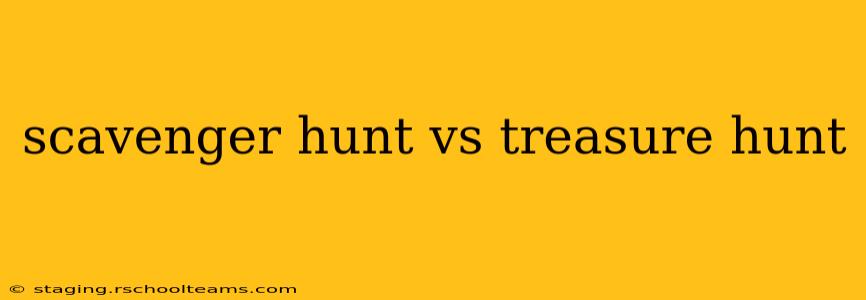The terms "scavenger hunt" and "treasure hunt" are often used interchangeably, but there are subtle yet significant differences between the two. Understanding these distinctions can help you plan a more engaging and successful event, whether it's for children, adults, or a corporate team-building exercise. This guide will delve into the key differences, addressing common questions and providing examples to clarify the nuances.
What is a Scavenger Hunt?
A scavenger hunt focuses on finding specific items or completing tasks. The clues provided lead participants to various locations or require them to perform certain actions. The goal isn't necessarily to find a single, grand prize, but rather to successfully complete the list of challenges. The satisfaction comes from the journey of discovery and problem-solving involved. Think of it as a series of mini-challenges that, when completed, lead to a sense of accomplishment.
Example: A scavenger hunt might involve finding a red feather, taking a picture next to a specific landmark, solving a riddle to uncover a hidden location, or even performing a silly task like singing a song. The final "prize" might be a small treat or simply the bragging rights of being the first team to complete the hunt.
What is a Treasure Hunt?
A treasure hunt, on the other hand, typically centers around locating a hidden treasure. This treasure can range from a small trinket to a larger prize. The focus is on the ultimate goal of finding the hidden treasure, with clues serving as a roadmap to its location. The excitement builds with each clue solved, culminating in the thrill of discovering the hidden prize.
Example: A classic treasure hunt might involve a series of riddles or coded messages, each leading to a new location. The final clue reveals the location of a buried chest filled with gold coins (or a more modern equivalent like gift cards or other prizes).
What are the Key Differences?
Here's a table summarizing the key differences:
| Feature | Scavenger Hunt | Treasure Hunt |
|---|---|---|
| Primary Goal | Finding items or completing tasks | Locating a hidden treasure |
| Focus | The journey and problem-solving | The destination and the treasure itself |
| Clues | Can be diverse; riddles, photos, tasks, etc. | Often more sequential and narrative-driven |
| Prize | Often smaller, symbolic, or multiple small prizes | Typically a larger, more significant prize |
| Structure | More flexible and adaptable to different settings | Usually more structured and follows a clear path |
What's the difference between a scavenger hunt and a treasure hunt for kids?
For kids, the difference is mainly in the perceived end goal. A scavenger hunt for children might focus on finding specific toys or objects around the house or yard, rewarding them with stickers or small treats upon completion of the list. A treasure hunt, geared towards younger participants, might involve simpler clues and a more visually appealing treasure, like a small toy or candy. The excitement is in the discovery of the hidden prize.
Are there any overlaps between scavenger hunts and treasure hunts?
Yes, there can be significant overlap. A well-designed event could incorporate elements of both. For example, a hunt could require participants to solve riddles (treasure hunt element) to find locations where they must then complete a specific task (scavenger hunt element) to obtain a piece of the final "treasure." The key is to understand the core focus and tailor the design accordingly.
Which is better for a corporate team-building event?
Both scavenger hunts and treasure hunts can be effective for team-building. A scavenger hunt might encourage collaboration and problem-solving skills as teams work together to complete the various tasks. A treasure hunt, with its focus on a shared goal, can foster a sense of teamwork and shared accomplishment. The best choice depends on your specific objectives and the preferences of your team.
By understanding the core differences between scavenger hunts and treasure hunts, you can craft a truly engaging and memorable experience tailored to your specific needs and audience. Remember to prioritize fun, creativity, and a sense of accomplishment, regardless of whether you choose a scavenger hunt, a treasure hunt, or a thrilling blend of both!
